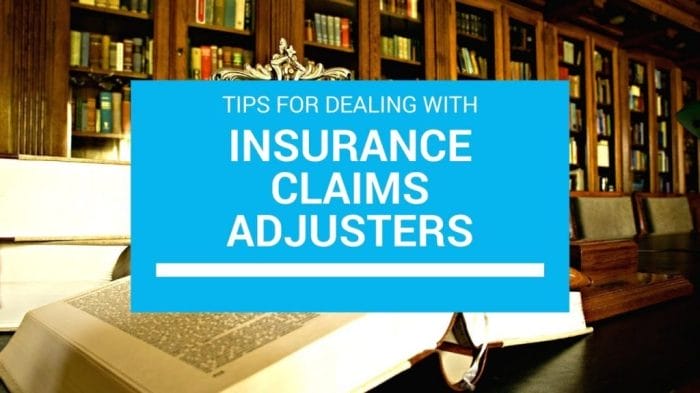In the realm of insurance claims, dealing with adjusters can be a daunting task. They hold the keys to approving or denying claims, and their decisions can significantly impact your financial well-being. To navigate this intricate landscape successfully, it’s essential to equip yourself with the knowledge and strategies to communicate effectively, understand your coverage, and negotiate a fair settlement.
This comprehensive guide will delve into the intricacies of dealing with insurance adjusters, providing invaluable tips and insights to help you protect your rights and maximize your claim outcomes. From fostering open communication to understanding your policy details, from negotiating effectively to exploring alternative dispute resolution options, we’ll cover it all.
Communication

Establishing open and effective communication with insurance adjusters is paramount to ensuring a successful claim process. By engaging in active listening, displaying empathy, and posing clear inquiries, you can foster a positive relationship with the adjuster, ultimately leading to a more favorable outcome.
Active Listening and Empathy
Active listening entails paying close attention to the adjuster’s words, both verbal and nonverbal. Demonstrate your attentiveness by maintaining eye contact, nodding in agreement, and asking follow-up questions. Empathy involves understanding and acknowledging the adjuster’s perspective, even if you disagree.
By showing empathy, you create a connection that encourages the adjuster to be more receptive to your concerns.
Clear and Concise Questions
When posing questions to the adjuster, strive for clarity and conciseness. Avoid rambling or asking multiple questions at once. Instead, focus on one specific query at a time, ensuring it is directly relevant to your claim. Additionally, avoid accusatory or confrontational language, as this can hinder productive communication.
Documentation

Maintaining thorough documentation is crucial when dealing with insurance adjusters. It strengthens your claim, ensures accurate communication, and provides a clear record of the entire process.
Gathering Relevant Documentation
Begin by gathering all relevant documents related to your claim. This may include:
- Insurance policy: Review your policy to understand your coverage and the specific requirements for filing a claim.
- Claim form: Obtain the appropriate claim form from your insurance company and fill it out completely.
- Proof of loss: Provide documentation that verifies your loss, such as receipts, estimates, or photos.
- Correspondence: Keep copies of all correspondence with your insurance company, including emails, letters, and phone call records.
Organizing Documentation
Once you have gathered all relevant documentation, organize it neatly and chronologically. This will make it easier for you and the insurance adjuster to review and understand the information.
Consider using a binder or folder to store your documents. Label each section clearly so that you can easily find the information you need.
Keeping Accurate Records of Communications
It is important to keep accurate records of all communications with your insurance adjuster. This includes phone calls, emails, and in-person meetings.
For phone calls, jot down the date, time, and a brief summary of the conversation. For emails, save the messages in a dedicated folder.
Detailed Notes, Photographs, and Receipts
When documenting your claim, be as detailed as possible. Provide specific information about the damage or loss, including the date, time, and location of the incident.
Take photographs of the damage to support your claim. If possible, take photos from different angles and include close-ups of any specific areas of damage.
Keep receipts for any expenses related to your claim, such as repairs, replacements, or temporary living arrangements.
Understanding Coverage
Navigating insurance policies and coverage limits can be daunting, but a clear understanding is essential for effective communication with adjusters. Here’s how to grasp your coverage:
Reading and Understanding Your Policy
Read your policy thoroughly, not just when filing a claim. Familiarity with its terms, conditions, and limitations empowers you during discussions with adjusters.
Clarity on Deductibles, Exclusions, and Endorsements
Understand your deductible, the amount you pay before coverage kicks in. Know the exclusions, events or circumstances not covered by the policy. Endorsements modify or extend coverage; review them carefully.
Negotiation

Negotiation is crucial in reaching a fair settlement with insurance adjusters. Proper preparation, knowledge of your rights, and persistence are essential elements of successful negotiation.
Know Your Policy and Rights
Thoroughly understand your insurance policy, including coverage limits, exclusions, and any applicable state regulations. Familiarize yourself with your rights as a policyholder, including the right to file an appeal if you disagree with the initial settlement offer.
Filing a Complaint

Navigating the complexities of filing a complaint against an insurance company or adjuster requires a well-informed and organized approach. Adhering to the proper procedures, gathering substantial evidence, and documenting every step of the process are essential elements for a successful complaint.
When filing a complaint, it is crucial to understand the specific grievance you have against the insurance company or adjuster. Clearly Artikel the details of the dispute, including dates, names, and relevant policies or agreements. Compile all supporting documentation, such as correspondence, claim forms, and any other relevant paperwork.
This documentation will serve as evidence to substantiate your complaint.
Gathering Evidence and Documentation
Compiling a comprehensive dossier of evidence is vital for supporting your complaint. Gather all relevant documents, including:
- Insurance policy documents: Review your policy thoroughly to understand your coverage, rights, and responsibilities.
- Correspondence: Keep records of all communications with the insurance company, including emails, letters, and phone call logs. Note the date, time, and substance of each interaction.
- Claim forms and supporting documents: Collect all claim forms, medical records, repair estimates, and any other documentation related to your claim.
- Witness statements: If applicable, obtain written statements from witnesses who have knowledge of the incident or dispute.
Alternative Dispute Resolution

Intro ParagraphIn the event that you are unable to reach an agreement with your insurance adjuster, there are alternative dispute resolution (ADR) methods available to help resolve the dispute without resorting to litigation. Mediation and arbitration are two common forms of dispute resolution that can be used to resolve insurance disputes.
Mediation
Mediation is a form of dispute resolution in which a neutral third party (the mediator) helps the parties to a dispute reach an agreement. The mediator does not make a decision in the case, but rather helps the parties to explore their interests and options and to develop a solution that meets the needs of both parties.
Mediation is often used to resolve insurance disputes because it is a relatively quick and inexpensive process that can help the parties to avoid the time and expense of litigation.
Arbitration
Arbitration is a form of dispute resolution in which a neutral third party (the arbitrator) hears evidence from both parties and then makes a decision in the case. Arbitration is generally more formal than mediation, and it can be more expensive and time-consgnu than mediation.
However, arbitration is often used to resolve insurance disputes because it is a final and binding form of dispute resolution that can help the parties to avoid the uncertainty and expense of litigation.
Benefits of Mediation and Arbitration
There are a number of benefits to using mediation or arbitration to resolve insurance disputes. These benefits include:* Mediation and arbitration are generally faster and less expensive than litigation.
- Mediation and arbitration can help the parties to preserve their relationship.
- Mediation and arbitration can help the parties to reach a solution that is tailored to their specific needs.
- Mediation and arbitration are confidential, which can help to protect the parties’ privacy.
Hiring an Attorney

When dealing with insurance adjusters, hiring an attorney might be necessary. An experienced insurance attorney can assist you in navigating the complexities of insurance policies and claims.
Choosing an Insurance Attorney
- Look for an attorney with experience handling insurance claims similar to yours.
- Check their reputation and qualifications, including bar admission, years of experience, and client testimonials.
- Ensure clear communication and realistic expectations. Ask about their fees, payment structure, and estimated timeline for resolving your case.
Preventing Insurance Disputes
Preventing insurance disputes from arising in the first place is crucial for maintaining a smooth and positive relationship with your insurance company. Clear communication, regular policy reviews, and understanding your coverage can help minimize the chances of disputes.
Clear and Open Communication
Open and honest communication is the cornerstone of preventing insurance disputes. Maintain regular contact with your insurance company to ensure that they have the most up-to-date information about your property, vehicles, and other insured assets.
- Promptly report changes: Notify your insurance company promptly about any changes in your circumstances, such as a new address, a new vehicle, or a renovation to your property. This ensures that your coverage remains accurate and up-to-date.
- Ask questions: If you have any questions or concerns about your policy, don’t hesitate to contact your insurance company. They are there to help you understand your coverage and answer your questions.
- Keep records of communication: Maintain a record of all your communications with your insurance company, including phone calls, emails, and letters. This documentation can be invaluable if a dispute arises.
Regular Policy Reviews and Updates
Your insurance needs can change over time. Regularly reviewing your policy and making necessary updates can help prevent coverage gaps and disputes.
- Schedule annual reviews: Make it a habit to review your insurance policy annually. This allows you to assess your current coverage, identify any gaps, and make adjustments as needed.
- Consider life changes: Major life events, such as getting married, having children, or buying a new home, can impact your insurance needs. Review your policy after such events to ensure that you have adequate coverage.
- Be aware of policy changes: Insurance companies may make changes to their policies from time to time. Stay informed about these changes by reading your policy renewal notices carefully and contacting your insurance company if you have any questions.
Additional Resources

Staying informed and educated about your insurance rights is essential when dealing with insurance adjusters. Various resources are available to assist consumers in understanding their rights and resolving disputes.
Government Agencies
- National Association of Insurance Commissioners (NAIC): The NAIC is a non-profit organization that serves as a forum for state insurance regulators. It provides information on insurance laws and regulations, consumer assistance, and a complaint database.
- Federal Trade Commission (FTC): The FTC is a federal agency that protects consumers from unfair or deceptive business practices. It has information on insurance scams and how to file a complaint.
- Consumer Financial Protection Bureau (CFPB): The CFPB is a federal agency that regulates consumer financial products and services. It has information on insurance policies and how to file a complaint.
Consumer Protection Organizations
- Consumer Federation of America (CFA): The CFA is a non-profit organization that advocates for consumer rights. It provides information on insurance issues and how to file a complaint.
- National Consumer Law Center (NCLC): The NCLC is a non-profit organization that provides legal assistance to consumers. It has information on insurance policies and how to file a complaint.
- Center for Insurance Research (CIR): The CIR is a non-profit organization that conducts research on insurance issues. It provides information on insurance policies and how to file a complaint.
Insurance Industry Resources
- Insurance Information Institute (III): The III is a non-profit organization that provides information about insurance to consumers. It has information on insurance policies and how to file a complaint.
- American Council of Life Insurers (ACLI): The ACLI is a trade association representing the life insurance industry. It provides information on life insurance policies and how to file a complaint.
- National Association of Mutual Insurance Companies (NAMIC): The NAMIC is a trade association representing the mutual insurance industry. It provides information on mutual insurance policies and how to file a complaint.
Last Recap

Remember, insurance adjusters are individuals with a job to do, just like you. By approaching them with respect, clarity, and a willingness to collaborate, you can significantly improve your chances of a favorable outcome. Stay informed, be prepared, and don’t hesitate to seek professional assistance if necessary.
With the right strategies and a proactive approach, you can successfully navigate the complexities of dealing with insurance adjusters and ensure a fair resolution to your claim.
Answers to Common Questions
What is the most important factor in dealing with insurance adjusters?
Effective communication is key. Actively listen to their perspective, ask clear questions, and maintain a respectful and professional demeanor throughout the process.
How can I ensure I have a strong case for my claim?
Gather and organize all relevant documentation, including policy details, receipts, photographs, and any other supporting evidence. Keep accurate records of all communications with the insurance company.
What should I do if I disagree with the adjuster’s assessment of my claim?
Don’t be afraid to negotiate. Be prepared with facts and evidence to support your position. If necessary, consider involving an insurance attorney to represent your interests.
What are my options if I’m not satisfied with the outcome of my claim?
Explore alternative dispute resolution methods such as mediation or arbitration. These processes can often lead to a quicker and more favorable resolution than traditional litigation.
How can I prevent insurance disputes from arising in the first place?
Maintain clear and open communication with your insurance company. Regularly review and update your policy to ensure it meets your changing needs. By being proactive, you can minimize the likelihood of disputes.



